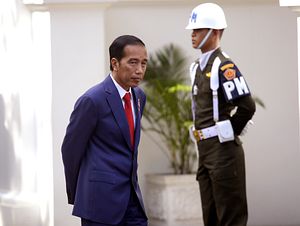Just how notable is the Indonesian government’s recent submission at the United Nations citing the July 2016 ruling by the Hague-based arbitral tribunal at the Permanent Court of Arbitration on the South China Sea in Philippines v. China? Last week, Jakarta’s UN mission submitted a “note verbale” (an official diplomatic communication) to the office of the UN Secretary-General opposing what one report described as “a series of circular notes filed by Being in relation to Malaysia’s application to define the limits of its extended continent shelf.”
The Malaysian application was a late-2019 surprise and may have had something to do with why one of its state-owned oil company’s drillships, the West Capella, was at the center of a recent tense standoff in the South China Sea, spurred by Chinese activity. (Some more background on Malaysia’s late-2019 submission here.)
The latest Indonesian submission accepted one of the most important components of the 15-point, 500+ page award, which found, among other things, that none of the contested features in the Spratly Islands could be considered an “island” in the international legal sense of the word as understood in the United Nations Convention on the Law of the Sea. As a corollary, “no maritime feature in the Spratly islands is entitled to an exclusive economic zone or a continental shelf of its own.”
The Indonesian side added the following:
Indonesia reiterates that the 9-dash line map implying historic rights claim clearly lacks international legal basis and is tantamount to upset UNCLOS 1982.
…
This view has also been affirmed by the Award of 12 July 2016 by the Tribunal that any historic rights that the People’s Republic of China may have had to the living and non-living resources were superseded by the limits of the maritime zones provided for by UNCLOS 1982.
To supporters of international law, Jakarta’s willingness to explicitly cite the 2016 ruling will be welcome. Days before the award’s July 12, 2016, release, the Philippines experienced a transition of government from that of Benigno Aquino III, who was forward-leaning on the matter and oversaw Manila’s submission of the case, to Rodrigo Duterte, who effectively turned Philippine foreign policy 180-degrees on China in a few short months.
As a result, without Manila making the case for the award, which was overwhelmingly decided in favor of the Philippines (without China’s formal participation), it found little currency in regional politics. The Association of Southeast Asian Nations remained mostly divided, with the South China Sea matter remaining limited in scope, especially at multilateral settings.
Indonesia, which is not a formal territorial claimant in the South China Sea, has seen its relationship with Beijing deteriorate over overlapping maritime claims near the Natuna Islands. In this part of Indonesia’s exclusive economic zone, China’s ambiguous nine-dash line claim overlaps; incidents involving Chinese law enforcement vessels and fishing trawlers have become all too common for Jakarta.
On two levels, Indonesia’s recent statement is notable. First, Jakarta’s status as something of a first-among-equals in ASEAN remains notable. By making the 2016 ruling part of its own policy on the South China Sea, we may be seeing an Indonesia more keen to take a similar approach in the ten-member grouping. Second, Indonesia’s willingness to cite the 2016 award may come to bear on Vietnam’s decision-making; as Derek Grossman writes in The Diplomat recently, international legal action is “under serious consideration at the moment” in Hanoi.
Over at the South China Morning Post, Indonesian foreign policy expert Evan Laksmana cautions not to read too much into Jakarta’s submission, noting that the move does not amount to an “overhaul,” but an extension of Indonesia’s existing policies that have taken shape under the presidency of Joko Widodo.
Importantly, Laksmana contextualizes Jakarta’s overall policy approach as being “rooted in international law and multilateralism.” From the perspective of self-interest, relying on an easily accessible international legal precedent—the most significant one for the South China Sea by far—makes sense for Jakarta as it seeks to protect its own interests.

































